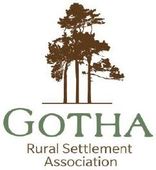Florida Frontiers "Reviving the German Community of Gotha, Florida"
HISTORY OF GOTHA
Gotha is a Historic Rural Settlement nestled in Southwest Orange County, celebrated for its rich horticultural heritage. This census-designated place (CDP), located between Windermere and Ocoee, had a population of 1,915 according to the 2010 census and is part of the Orlando-Kissimmee Metropolitan Statistical Area. It serves as the final resting place for the renowned painter Bob Ross and Dr. Henry Nehrling, a distinguished scientist, ornithologist, and botanist, whose historic Palm Cottage Gardens still thrive in Gotha. A Post Office was established in Gotha in 1883. The town itself was founded in 1885 by German immigrant H.A. Hempel, with Hempel Avenue, its main thoroughfare, named in his honor.
Founded on April 20, 1885
Gotha, Germany, has existed since the Middle Ages, mentioned by Charlemagne in 775. Gotha, Florida, was officially founded on April 20, 1885, located in Orange County between Ocoee and Windermere. In 1878, German printer Henry Hempel invented a revolutionary printing tool in Buffalo, New York. With his newfound wealth, he moved to Central Florida in 1879, purchasing land and creating a town plat by 1883, naming it after his German hometown. He established a sawmill to generate lumber, enabling the construction of a general store, post office, school, and community hall in Gotha, and supplied materials for homes in nearby cities and orange crates for the citrus industry.
“Gotha in the 1890s was a very lively community,” says Kathleen Klare, director of the Gotha Rural Association, Inc. “It had Turner Hall where it had musical events, minstrel shows, and dance events. They taught gymnastics. They even had a bowling alley in the 1890s. Because of the background and the intellect of these German people, they were rebuilding the character of their old German culture, and they were building it in the woods of Florida.” At the same time that Hempel was organizing his German colony in Florida, the German Freethinkers League was founded by philosopher Ludwig Büchner. “Hempel was not just building a little town,” says Klare. “Hempel was a freethinker. He was looking to build a colony of people that had similar perspectives.” Freethinkers believed in the individuality of thought and forming one’s own opinions based upon logic, reason, and empirical data rather than authority, tradition, or religious dogma. “Secular points of view were what they were espousing,” says Klare.
Dr. Henry Nehrling
Horticulturist and naturalist Dr. Henry Nehrling began acquiring land in Gotha in 1885. Initially, Nehrling spent only a few months each year in Gotha. “During that period, he was employed by the Milwaukee Public Museum and didn't officially relocate to Gotha until 1902,” notes Klare. Nehrling established Palm Cottage Gardens, a tropical paradise that evolved into a favored tourist attraction in the early twentieth century. He also created an experimental testing facility on the premises, playing a pivotal role in advancing Florida’s ornamental horticulture. Nehrling authored numerous articles for academic journals and magazines and gained recognition for his hybrid palms, caladiums, amaryllis, magnolias, and other plants native to Florida and tropical regions worldwide.
Nehrling’s Palm Cottage Gardens was placed on the National Register of Historic Sites in 2000. Many of the German families who first settled Gotha in the 1880s made their living in the citrus industry. When the Big Freeze of 1894-95 devastated orange crops in Florida, some of those families left the state. As the citrus industry recovered in the early twentieth century, new families moved to Gotha, but the community began to lose its distinctively German identity. “As the citrus industry is gradually coming back, it’s offering job opportunities,” says Klare. “What you get is migration from neighboring states like Georgia and Alabama, but you’re getting different groups of people.” The urban sprawl of the greater Orlando area is encroaching upon Gotha. The Gotha Rural Settlement Association, Inc. hopes to preserve the few remaining historic structures in the town. “We do have a few buildings,” says Klare. “We have an old Gothic church that was built in 1913, that needs an awful lot of upkeep.” Gotha also has the 1916 One Room Schoolhouse, also known as the Gotha Community Center;’ Yellow Dog Eats once the
The organization also wants to share the unique history of Gotha to help revive a sense of community in the town. “I grew up in the Gotha community,” says Klare. “My family came in 1911. There were always community events, picnics, dinners, and different kinds of things that the Women’s Clubs were doing. It was very active. That has died since the 1990s. There’s a group of us now that would really like to bring back a sense of community.”
HELP PRESERVE GOTHA
GET INVOLVED
GRSA offers volunteer opportunities in Gotha, including historic preservation, environmental conservation, arboriculture, and community outreach. All volunteers are welcome.
CONTRIBUTE
Support the Gotha Rural Settlement Association Inc by donating through our PayPal account. As a registered 501(c)(3) non-profit organization, your contributions are tax-deductible.
LEARN MORE
The Gotha 1916 Schoolhouse (Gotha Community Center) is our priority for historic preservation, but we have many other projects where volunteers can help.
ABOUT GOTHA RURAL SETTLEMENT
Gotha is a Historic Rural Settlement in Southwest Orange County, rich in horticultural history. This census-designated place (CDP), located between Windermere and Ocoee, had a population of 1,915 as of 2010 and is part of the Orlando-Kissimmee Metropolitan Statistical Area. Notably, it is the resting place of painter Bob Ross and scientist Dr. Henry Nehrling, whose Palm Cottage Gardens still exists in Gotha. A Post Office opened in 1883, and Gotha was founded in 1885 by German immigrant H.A. Hempel, honored by naming the main street Hempel Avenue.
As a former official town, Gotha lacks local government representation and direct funding. We aim to foster leadership and community involvement among our over 2,000 residents. By collaborating and sharing resources, we can enhance Gotha’s special character and ensure our community identity and pride thrive.

